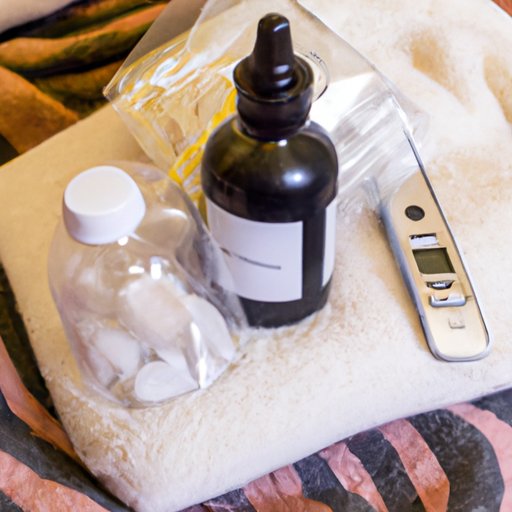
I. Introduction
Fevers can be uncomfortable and worrying, but they are often a sign that your body is fighting off an infection. In this article, we will explore various ways to bring a fever down and ease your discomfort. From medication to rest to essential oils, there are plenty of options to try. It is important to note that while these remedies can be effective, if your fever persists or worsens, it is essential to seek medical attention.
II. Using medications like acetaminophen or ibuprofen
Acetaminophen and ibuprofen are two commonly used medications for reducing fever. They work by blocking the production of certain chemicals in the body that cause fever, inflammation, and pain. It’s best to check with your doctor to determine which one is best for you. You should also follow the recommended dosage and not exceed the stated maximum dose.
III. Drinking fluids
Drinking plenty of fluids is essential when you’re experiencing a fever. These fluids can help prevent dehydration, which can make a fever worse. Stick to water, herbal teas, and electrolyte drinks like Gatorade. It’s best to avoid sugary or alcoholic drinks, as they can lead to dehydration.
IV. Rest and sleep
When you’re fighting off an infection, getting enough rest and sleep is crucial. Your body needs extra energy to fight off any viruses, bacteria, or other germs that may be causing your fever. You may need to modify your work and other daily activities until your body has recovered.
V. Taking a lukewarm bath
A lukewarm bath can be an effective way to reduce your body temperature and soothe your symptoms. It’s essential not to use cold water as this can cause shivering that can raise the body temperature. Instead, use a tub or shower with lukewarm water. Allow yourself to soak for 10 to 15 minutes and avoid overdrying your skin with towels.
VI. Using a cool compress
A cool compress is another way to bring a fever down. This can be achieved by placing a cool, damp washcloth or towel on your forehead, neck, or underarms. It’s essential to replace the compress regularly and avoid using ice packs, which can be too cold and cause harm to your skin.
VII. Wearing light clothing
When you’re experiencing a fever, wearing light, breathable clothing can help regulate your body temperature. It’s best to avoid tight-fitting clothes that can trap in heat. Loose cotton outfits are the most comfortable while you recover.
VIII. Using essential oils
Essential oils have been used for centuries for their healing properties. Some of them can help reduce fever and alleviate symptoms that come with it. Peppermint oil, eucalyptus oil, and lavender oil are just a few that you can use. You should always dilute them before using and avoid applying them directly to your skin. Furthermore, pregnant women and children should avoid using some essential oils, so it’s important to consult with your doctor.
IX. Conclusion
Fever can be an uncomfortable and worrisome symptom, but fortunately, there are many effective ways to bring it down. In this article, we have explored various remedies, including medication, rest, fluids, baths, and essential oils. All these can help ease your symptoms, but it is essential to consult your doctor if your fever persists or worsens.





